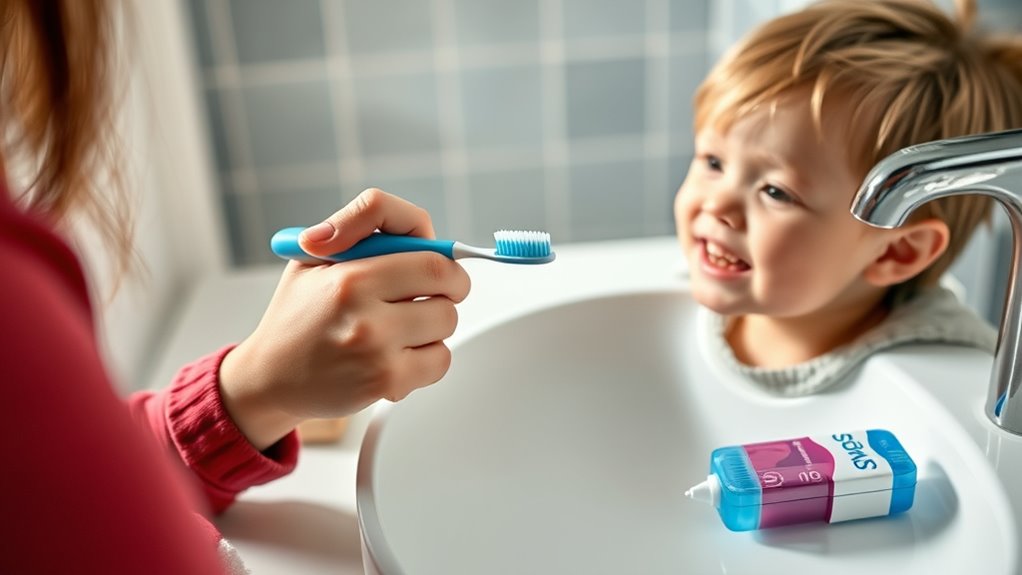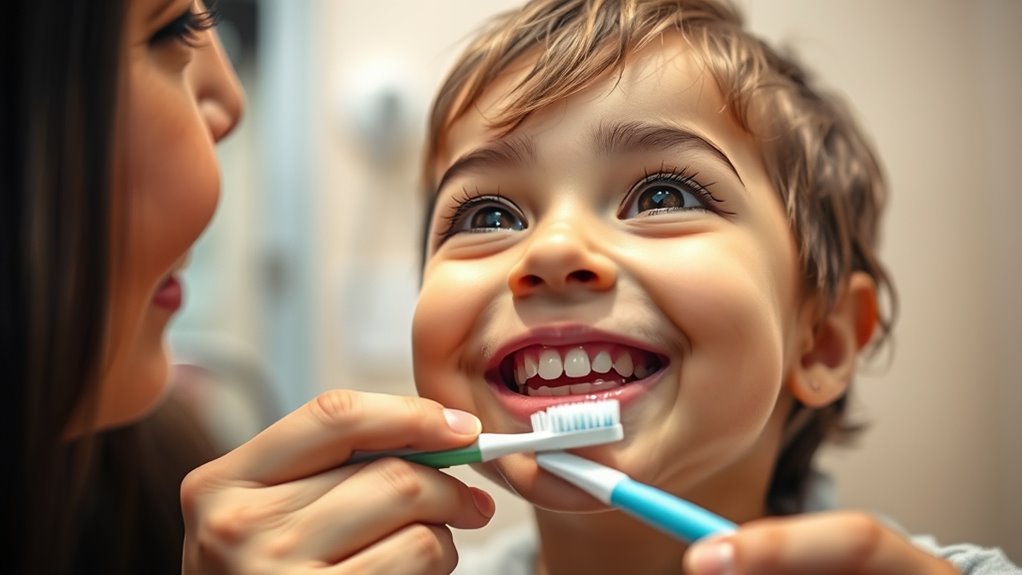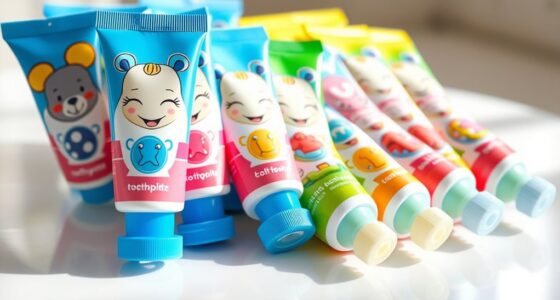As a parent, you play a key role in preventing tooth decay by helping your child establish good oral hygiene habits early, supervising proper brushing and flossing, and ensuring regular dental visits. You can manage your child’s diet by limiting sugary snacks and drinks, supporting healthy eating habits. Providing educational resources and emotional support also helps build positive attitudes toward dental care. Keep exploring ways to protect your child’s smile and set them up for lifelong dental health.
Key Takeaways
- Establish and supervise proper oral hygiene routines from early childhood, including brushing twice daily and supervised flossing.
- Schedule and ensure regular dental visits to monitor and prevent early signs of tooth decay.
- Educate children about healthy eating habits, limiting sugary snacks and drinks to reduce cavity risk.
- Model good oral care habits and reinforce routines through consistent parental involvement.
- Address dental anxiety early by familiarizing children with dental visits and providing reassurance.
Starting Oral Care Early in Childhood

Starting oral care early in childhood sets the foundation for healthy teeth and gums. Establishing good oral hygiene habits from the start helps promote children’s oral health and prevent cavities. Even before teeth emerge, gently clean your baby’s gums with a damp cloth each day. Once teeth appear, switch to a soft-bristled toothbrush and a small amount of fluoride toothpaste, brushing twice daily. Consistent routines make oral care a natural part of daily life, encouraging lifelong habits. Supervise and assist with brushing until your child can do it effectively on their own, typically around age 7. Regular dental visits during early childhood and age-appropriate education reinforce the importance of oral health, setting your child up for a lifetime of healthy smiles. Implementing regular oral hygiene routines can significantly reduce the risk of developing dental issues later on.
Demonstrating Proper Brushing and Flossing Techniques

You can help your child develop good oral habits by modeling proper brushing and flossing techniques. Show them how to brush in small circles for two minutes. Gently slide floss between teeth without forcing it. Using visual aids and consistent supervision will reinforce these routines effectively. Incorporating consistent messaging about oral hygiene can strengthen your child’s understanding and commitment to good dental care. Recognizing the importance of prophetic dreams can also inspire parents to encourage their children to be attentive to their subconscious messages and develop awareness of their dreams’ significance. Additionally, using exfoliating techniques such as glycolic acid may improve the overall health and appearance of their skin, supporting their confidence in personal care routines. Emphasizing the role of automation in business can introduce practical ways to streamline daily routines and foster independence in children as they learn to manage their personal hygiene.
Modeling Effective Techniques
Demonstrating proper brushing and flossing techniques is essential for helping children develop good oral hygiene habits. When you model effective oral hygiene practices, your children learn by example, making it easier for them to adopt proper brushing techniques. Show them how to brush in small circular motions, covering all tooth surfaces for at least two minutes twice daily. During demonstrations, teach them how to gently slide floss between teeth, curving it around each tooth to remove plaque without hurting gums. Using visual aids or models can make these demonstrations clearer and more engaging. By maintaining your own consistent oral hygiene routines visibly, you reinforce the importance of these techniques, encouraging your children to follow suit and develop lifelong habits that prevent tooth decay. Incorporating well-drained soil and full sun into your garden can also promote overall health, similar to how proper oral care supports healthy teeth.
Reinforcing Consistent Routines
Reinforcing consistent routines is essential for helping children develop lifelong good oral hygiene habits. You should supervise brushing and flossing until your child can effectively clean their teeth on their own, usually around age 7 to 10.
Use age-appropriate toothbrushes and fluoride toothpaste, demonstrating the proper amount and motion needed to remove plaque. Teach your child to brush for at least two minutes twice daily, ensuring all tooth surfaces are thoroughly cleaned.
Regularly check their technique to confirm they’re effectively removing plaque and preventing tooth decay. By consistently reinforcing these oral care habits, you help set a foundation for healthy teeth and gums.
Establishing this routine makes good oral hygiene second nature, considerably reducing the risk of cavities and other dental issues. Recognizing soulmate angel numbers can also serve as a reminder to nurture your relationship with your child, fostering emotional well-being alongside their physical health.
Additionally, understanding the role of contrast ratio in projectors can help you create an optimal environment for teaching proper brushing techniques by ensuring clear visibility and focus.
Scheduling and Attending Regular Dental Visits

Scheduling and attending regular dental visits plays a crucial role in maintaining your child’s oral health. These visits allow dental professionals to prevent tooth decay through early detection and tailored advice. The American Academy of Pediatrics recommends the first dental visit by age one, setting the foundation for lifelong habits. Consistent dental checkups every six months help monitor oral health, identify issues early, and reinforce good hygiene practices. Your support in prioritizing these appointments creates a routine that emphasizes the importance of ongoing care. By actively scheduling and attending these visits, you help reduce long-term dental problems and costs. Regular checkups also help identify any potential environmental factors that could impact your child’s dental health, ensuring comprehensive preventive care. Understanding the importance of prevention strategies can further empower you to take proactive steps in safeguarding your child’s smile. Additionally, emphasizing early intervention during these visits can significantly improve treatment outcomes and overall oral health. Maintaining a consistent schedule can also help address possible behavioral issues, making visits more comfortable for your child and promoting positive experiences. Recognizing the importance of patient education during dental visits can lead to better at-home oral care routines.
Managing Diet and Limiting Sugary Snacks

Managing your child’s diet is vital for preventing tooth decay, especially by limiting sugary snacks and drinks. Consuming sugary snacks more than 5-7 times daily increases the risk of cavities, so aim to reduce their frequency.
Instead, offer healthy alternatives like fruits and vegetables, which support stronger teeth and better oral health. Excessive intake of sugary foods creates an environment where cavity-causing bacteria thrive, leading to dental problems. Being aware of seed allergy risks is also important if your child has known sensitivities, as some seeds may pose health concerns.
Educating your child about how sugar impacts dental health encourages better snacking habits. Incorporating proper nutrition and balanced meals can help maintain overall oral health. Effective diet management, combined with limiting sugary snack consumption, plays a key role in preventing tooth decay. Being aware of affiliate disclosures ensures transparency about recommendations and products that may support your oral health journey.
Encouraging Consistent Oral Hygiene Habits

Maintaining a healthy diet is a great start, but consistent oral hygiene habits are essential to keeping cavities at bay. You should supervise your child’s brushing and flossing twice daily for at least two minutes to ensure effective cleaning.
Supervise your child’s brushing and flossing twice daily for effective cavity prevention.
Demonstrating proper brushing and flossing techniques encourages your child to adopt regular oral care routines. Reinforcing the importance of oral care during daily activities helps establish lifelong habits from a young age.
Using age-appropriate fluoride toothpaste and guiding your child on spitting promote safe and effective brushing. Regular parental oversight and encouragement greatly increase the chances your child will maintain consistent oral hygiene practices.
To support habit formation, consider:
- Modeling good oral care behaviors
- Setting consistent routines
- Providing positive reinforcement
- Emphasizing the importance of dental health in overall well-being
Additionally, incorporating smart toothbrushes with automatic timers can help ensure your child brushes for the recommended time and develops proper technique. Proper technique development is crucial for effective plaque removal and cavity prevention.
Furthermore, monitoring payment data security measures can help protect your child’s personal information and prevent fraud.
A comprehensive approach to AI security can also help safeguard digital health records and ensure privacy.
Providing Educational Resources and Support

Providing clear, accessible educational materials helps you better understand how to care for your child’s teeth. Parental guidance strategies and community support initiatives can boost your confidence and connect you with helpful resources. Incorporating best practices in oral health education can further enhance your ability to prevent tooth decay effectively. When you stay informed and engaged, you can effectively prevent tooth decay and promote lasting oral health. Additionally, emphasizing preventive care techniques can significantly reduce the risk of cavities and other dental issues. Staying aware of cybersecurity vulnerabilities, like those seen during the recent Microsoft outage, underscores the importance of safeguarding your personal and family information online. Recognizing how second trimester development influences your child’s health can help you better support their growth and well-being. Understanding modern dental technology and its role in early detection can also improve your child’s dental care outcomes.
Accessible Educational Materials
Accessible educational materials play a vital role in empowering parents to support their child’s oral health. When you have access to clear brochures, videos, and online resources, you can better understand oral hygiene, preventive dental care, and healthy eating habits. These materials help you make informed decisions about your child’s dental routine and address specific cultural or socioeconomic barriers. To maximize their impact, look for resources that:
- Clearly explain the benefits of fluoride, sealants, and proper brushing techniques
- Offer interactive demonstrations and Q&A sessions for hands-on learning
- Are tailored to your community’s cultural and language needs
- Incorporate evidence-based information, such as the importance of preventing tooth decay, to guide your practices. Additionally, incorporating digital literacy into educational efforts can enhance your child’s understanding of oral health through engaging online tools and resources. Utilizing a variety of educational toys and materials can further reinforce good habits and make learning about dental health more engaging for children. Regularly utilizing these evidence-based educational materials during dental visits reinforces good practices and encourages sustained behavior change, ultimately reducing your child’s risk of tooth decay. Developing personalized oral health plans with your dentist can also help tailor strategies to your child’s specific needs, promoting better outcomes. Furthermore, understanding the role of somatic therapy techniques in managing stress and anxiety related to dental visits can make the experience more comfortable for children.
Parental Guidance Strategies
Offering parents educational resources and support is essential for establishing consistent oral health routines in children. Effective parental guidance helps prevent tooth decay by equipping you with the knowledge to promote good oral health habits.
Providing dental education through informational materials on fluoride, diet, and routine dental visits reinforces healthy behaviors at home. Support programs that include demonstrations or workshops boost your confidence and motivation to maintain regular oral care routines.
Access to tailored guidance from dental professionals empowers you to make informed decisions about preventive measures like sealants and fluoride treatments. Ongoing education ensures you stay engaged in your child’s oral health, reducing the risk of childhood tooth decay.
With the right resources, you can play a vital role in safeguarding your child’s dental health.
Community Support Initiatives
Community support initiatives play an essential role in enhancing your ability to prevent tooth decay by delivering educational resources and practical assistance. These community programs provide brochures, workshops, and online materials that boost your understanding of effective oral health practices.
Local efforts often include free or subsidized dental screenings and fluoride treatments, making preventive care accessible. Support groups and community events also improve your knowledge about healthy dietary choices that help prevent decay.
Collaborative efforts between dental professionals and community organizations ensure culturally sensitive information reaches diverse populations. By participating in these initiatives, you can:
- Access targeted oral health education tailored to your community
- Increase parental engagement in preventive care
- Gain resources that support healthier dietary habits for your children
Recognizing and Addressing Dental Anxiety

Recognizing dental anxiety in children is essential because their feelings often reflect their parents’ attitudes toward dental care. If your child shows signs of fear, address it early by understanding their emotions. Early exposure to positive dental visits and familiarization can help reduce long-term dental anxiety. Use calming techniques like distraction, praise, or gentle reassurance to ease their fears. Pay attention to behaviors such as clinging or crying, which may indicate discomfort. Educating yourself about signs of dental fear lets you support your child’s emotional well-being effectively. By addressing these feelings promptly, you help foster a positive attitude toward dental visits, encouraging better oral health habits for life.
| Signs of Dental Anxiety | Calming Techniques | Parental Role |
|---|---|---|
| Clinging to parent | Distraction | Recognize early cues |
| Crying or whining | Positive reinforcement | Offer reassurance |
| Avoidance behaviors | Gentle approach | Model calm attitude |
| Fidgeting or restlessness | Familiarization | Support with patience |
| Increased heart rate | Breathing exercises | Encourage exposure |
Collaborating With Dental Professionals for Optimal Care

Collaborating closely with dental professionals is essential for guaranteeing your child’s oral health stays on track. Regular checkups, typically every six months, help monitor and prevent tooth decay effectively.
Working with your dentist allows you to develop personalized dental care plans, including fluoride treatments and sealants when needed.
Open communication keeps you informed about your child’s dental health and tailored preventive strategies.
To optimize care, consider these key points:
- Follow recommended visit schedules for consistent monitoring
- Discuss diet, oral routines, and behavior management with your dentist
- Seek evidence-based guidance to reduce decay risk at home
Partnering with dental professionals ensures you’re equipped with the knowledge and tools to prevent tooth decay and maintain your child’s oral health.
Frequently Asked Questions
How Can Parents Reduce the Risk of Tooth Decay?
You can reduce the risk of tooth decay by brushing your child’s teeth twice a day with fluoride toothpaste, especially after their first tooth appears.
Limit sugary snacks and drinks to fewer than 7 times daily, and schedule regular dental visits starting at age one.
Supervise proper brushing and flossing, and encourage a balanced diet rich in fruits, vegetables, and dairy to strengthen teeth and prevent cavities.
How Can We Prevent Tooth Decay?
Imagine your smile as a garden needing care. You can prevent tooth decay by brushing twice daily with fluoride toothpaste and flossing regularly.
Limit sugary snacks and drinks, which feed harmful bacteria.
Visit your dentist for checkups, starting early, to catch issues early.
Staying consistent with good habits and educating yourself about oral health transforms your routine into a shield, keeping your teeth healthy and strong for years to come.
How Can I Prevent My Child From Getting Tooth Decay?
To prevent your child from getting tooth decay, start brushing their teeth twice daily with fluoride toothpaste as soon as their first tooth appears.
Limit sugary snacks and drinks, and schedule regular dental checkups from age one.
Supervise their brushing and flossing until they can do it well themselves.
Encourage a balanced diet rich in fruits, vegetables, and dairy to keep their teeth strong and healthy.
Why Do I Keep Getting Cavities When I Take Care of My Teeth?
Did you know nearly 91% of adults have had cavities?
If you’re still getting them despite good care, it’s likely due to factors like frequent sugary foods, insufficient fluoride, or bacteria like Streptococcus mutans producing acids.
Hard-to-reach areas or genetic factors might also be at play.
Keep brushing thoroughly, cut back on sugar, and visit your dentist regularly to improve your dental health and reduce cavities.
Conclusion
By guiding your child through bright, minty mornings and gentle, thorough brushings at night, you create a shield of health that gleams with confidence. Your hands, like steady anchors, help them build habits that fend off the shadows of decay. With each visit and healthy snack, you’re painting a vibrant picture of strong teeth and happy smiles—an enduring masterpiece crafted by your love and vigilance. Together, you reveal the secret to a lifetime of dazzling, decay-free smiles.








